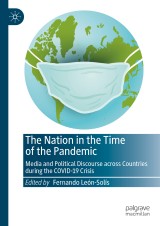Details

The Nation in the Time of the Pandemic
Media and Political Discourse across Countries during the COVID-19 Crisis|
149,79 € |
|
| Verlag: | Palgrave Macmillan |
| Format: | |
| Veröffentl.: | 27.07.2024 |
| ISBN/EAN: | 9783031566622 |
| Sprache: | englisch |
| Anzahl Seiten: | 304 |
Dieses eBook enthält ein Wasserzeichen.
Beschreibungen
This edited volume explores the media and political discourses during the COVID-19 crisis across thirteen nations. Despite warnings that a global pandemic was a matter of if rather than when, the virus caught governments worldwide unaware. The nature, extent and timespan of governmental responses varied significantly from country to country, but a number of features were common to all. The nation became the frame of reference used in an attempt to make sense of the crisis, to keep citizens united, to gain their trust, and to ensure compliance with unprecedented health mandates. With the same purpose, there was a recourse to ‘non-ideological’ values and narratives (sometimes abstract, sometimes political) that could be accepted by all stakeholders. The analyses evidence the perception of the fragility of liberal democracy, caused by too much political and media consensus, by too much political and media dissent and by the threat of populism. The wide-ranging scope and multi-perspective methodology of the analyses offered in this book are an essential reading for academics and students of Media Studies, Politics, Political Communication, and Discourse Analysis and their associated disciplines. Written in accessible language, this volume (full of insightful and at times surprising ideas) will be of interest for all those keen to understand the role of political and media discourse in the communication of the COVID-19 crisis and its wider implications for liberal democracies.
Part I: Introduction.- 1. The Nation in the Time of the Pandemic.- Part II : COVID-19 and Consensus .- 2. Did National Solidarity Trump Pluralism in National Media Coverage in Norway?.- 3. The Swedish National Media Narrative During the COVID-19 Crisis .- 4. ‘Each of Us is Responsible for All of Us’: Solidarity and National Responsibility in Irish Leaders’ COVID Speeches.- 5. A Narrative of Success: Press Coverage of the COVID-19 Vaccination Process in Portugal .- 6. The COVID Crisis as a Boost to National Identity in Gibraltar: Opinion Articles in the Gibraltarian Press.- 7. Conceptualisations of German National Identity During the COVID-19 Pandemic .- 8. Canada and the Marginalization of Pandemic Dissent .- Part III: COVID-19 and Dissent.- 9. Emotional Authority in Presenting the Later COVID-19 Strategy: The Speeches and Statements of Scotland’s Nicola Sturgeon.- 10. Welsh Devolution and the Politics of the COVID-19 Pandemic: Evolving Social Media Strategies.- 11. COVID-19and the Virus of Populism in Spain.- 12. ‘Immunitarian Democracy’: The Italian Media Coverage of the Coronavirus Pandemic.- Rinella Cere.- 13. State and Nationalism: The Greek Media’s Coverage of the COVID-19 Pandemic.- 14. Political Polarisation and the COVID-19 Crisis in Turkey.- Part IV: Conclusion.- 15. The Nation, COVID-19 and the Dangers for Liberal Democracy.
<p><b>Fernando León Solís </b>is Senior Lecturer in Spanish and Head of Languages at the University of the West of Scotland.</p>
<p>This edited volume explores the media and political discourses during the COVID-19 crisis across thirteen nations. Despite warnings that a global pandemic was a matter of if rather than when, the virus caught governments worldwide unaware. The nature, extent and timespan of governmental responses varied significantly from country to country, but a number of features were common to all. The nation became the frame of reference used in an attempt to make sense of the crisis, to keep citizens united, to gain their trust, and to ensure compliance with unprecedented health mandates. With the same purpose, there was a recourse to ‘non-ideological’ values and narratives (sometimes abstract, sometimes political) that could be accepted by all stakeholders. The analyses evidence the perception of the fragility of liberal democracy, caused by too much political and media consensus, by too much political and media dissent and by the threat of populism. The wide-ranging scope and multi-perspective methodology of the analyses offered in this book are an essential reading for academics and students of Media Studies, Politics, Political Communication, and Discourse Analysis and their associated disciplines. Written in accessible language, this volume (full of insightful and at times surprising ideas) will be of interest for all those keen to understand the role of political and media discourse in the communication of the COVID-19 crisis and its wider implications for liberal democracies.</p>
<b>Fernando León Solís</b> is Senior Lecturer in Spanish and Head of Languages at the University of the West of Scotland.
<b>Fernando León Solís</b> is Senior Lecturer in Spanish and Head of Languages at the University of the West of Scotland.
Explores features of political and media discourses and their impact on liberal democracies during the COVID-19 crisis Shows the role of national narratives in building trust Highlights the risks of excessive consensus/dissent
Diese Produkte könnten Sie auch interessieren:

Communicating Science in Social Contexts

von: Donghong Cheng, Michel Claessens, Nicholas R. J. Gascoigne, Jenni Metcalfe, Bernard Schiele, Shunke Shi

149,79 €















